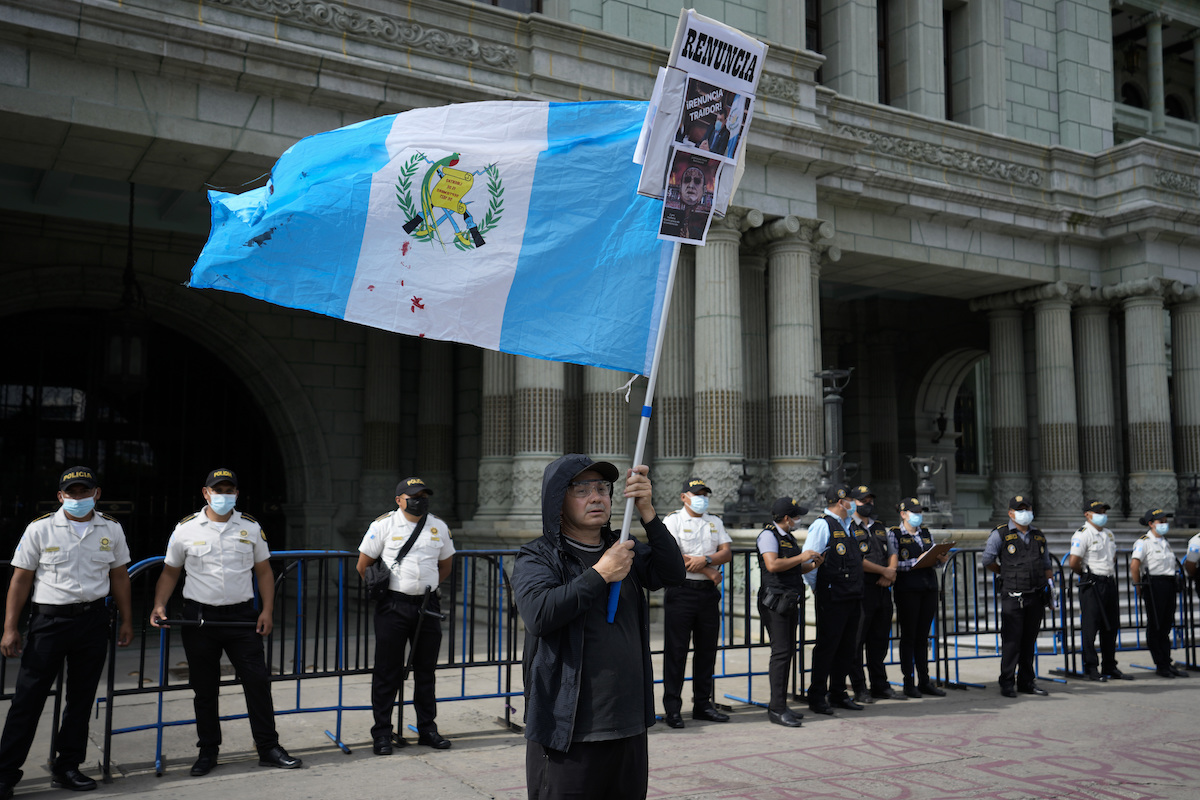

A protester waves a national flag during a rally demanding the resignation of Guatemalan President Alejandro Giammattei, claiming his government has mismanaged the coronavirus pandemic and botched efforts to get vaccines, in Guatemala City, Saturday, July 17, 2021. (AP Photo/Moises Castillo)
Welcome back to El Faro English.
COVID-19 infections reached an all-time high in Guatemala last week. Just one in 20 Guatemalans has gotten a dose of the vaccine —any vaccine— as the administration squabbles with the Russian government over the non-delivery of millions of shots it paid for in April. Key metrics of the pandemic, such as infections and deaths, are likely grossly undercounted.
“We still have no testing or contact tracing strategy to control the pandemic,” Óscar Chávez, of independent think tank and data clearinghouse Lab Datos GT, told El Faro English. “As we see a spike in cases almost double that of the peak in 2020, in reality, we know that the impact of the pandemic is much broader, but we just can’t see it.”
A fresh U.S. donation of 3 million Moderna vaccines announced on Friday —on top of the 1.5 million which Kamala Harris promised in June— has thrown President Alejandro Giammattei a political life raft as critics rally around the stalled vaccination campaign demanding he resign. He called a state of emergency on July 12 to dissuade protestors, which he accused of conspiring to spread the virus, from staging mass demonstrations outside his residence.
Experts say the country’s pandemic response —even with the vaccine donations— still lacks a coordinated rollout plan and distribution infrastructure, leaving millions of Guatemalans susceptible.
These shortfalls are especially acute in rural communities, reports Jeff Abbott for El Faro English. Of all administered vaccines, half have been administered in the capital, leaving smaller cities and rural towns largely unprotected. Left to themselves, municipalities have unevenly implemented COVID-19 containment measures—some permitting concerts, and others clamping down on business, transportation, and mobility.
“Unless the ministry [of health] takes the lead and unless there’s the political will in the administration to prioritize public health, the public will continue paying the price with their lives,” said Chávez.
Edgar Gutiérrez, Guatemalan political analyst and foreign minister from 2000 to 2004, says that the Guatemalan government’s Sputnik-V procurement from Russia was illegal, as the administration flouted a congressional decree in purchasing the vaccines through a foreign intermediary. In May, the Public Prosecutor’s Office opened a criminal investigation into the Sputnik-V vaccine procurement.
Leading Guatemalan human rights advocate Helen Mack told El Faro’s Roman Gressier in an interview that Giammattei allies in the judiciary will ultimately thwart any criminal investigation into the pandemic response. She’s one of the highest-profile figures to push for the resignation of Giammattei, the foreign minister, and the health minister for their pandemic response.
But times have changed since Guatemalans stormed the streets en masse to demand the resignation of former president Pérez Molina for corruption in 2015. In a country lacking strong opposition parties and an independent justice system, the odds of the resignation coming to fruition are slim.
“For their friends, candidates, magistrates, and judges who are taking their instructions from them,” she said of the Giammattei allies in the judiciary, “there’s no punishment for wrongdoing and the law doesn’t apply.”
COVAX Is Driving Regional Vaccination
The Biden administration announced Tuesday it will send 1.5 million Moderna vaccines to both Honduras and El Salvador, as well as 500,000 doses of Pfizer to Panama, as part of its COVAX vaccine-sharing program. El Salvador and Honduras both received a previous batch of the same quantity in the past month as the U.S. government asserts its geopolitical influence amid vaccine competition from China and Russia.
Honduras has administered at least one vaccine dose to three in 20 residents and continues relying on COVAX —some 3 million doses— as it hunts for more vaccines in the international market. Meanwhile, cases are surging. Over 100 people died of COVID in public hospitals over the weekend, with the country’s crumbling healthcare system struggling to contain an outbreak that has left ICU beds at over 90 percent capacity.
In El Salvador, the government has now received three million Moderna doses from the United States, as well as 3.5 million Sinovac doses from China, bolstering the Bukele administration’s vaccine campaign. On July 12, the administration opened up vaccination to anyone older than 18, and one in two residents have received at least one vaccine dose.
Relative to its neighbors, El Salvador’s vaccination campaign is whizzing along, though the country’s contagion trendline has slightly risen since April despite widespread vaccination. On July 13, the legislature banned concerts, meetings, holiday parties, and sporting events for 90 days. Bars, shopping malls, and schools will stay open.
Debilitated healthcare systems or single-party governments, across Central America, are at least partly to blame for the region’s lethargic —and at times dangerous— response to a pandemic maintaining its grip on the population.
***
A final note: On Monday night, President Bukele announced he would double the size of the Salvadoran Armed Forces to 40,000 troops over the next five years, as part of his administration’s Territorial Control Plan.
Duplicaremos nuestra Fuerza Armada en los próximos 5 años, iniciando hoy.
Cada quince semanas, entrará un grupo de nuevos soldados.
La recibimos con 15,000, con esta graduación tendremos 20,000 y la nueva orden es llevarla a 40,000 hombres y mujeres valientes y patriotas ?? https://t.co/6g92iD8vbm
— Nayib Bukele ?? (@nayibbukele) July 20, 2021
Read our reporting from March 2020 on the plan, “Bukele’s International Credit Line: The Next Step in Militarizing Public Safety.” Stay tuned for more details and analysis in an upcoming newsletter.
Thanks for reading. Reach out to us on Twitter to let us know what you’d like us to cover. And if you’ve gained from our work, pass it along.


